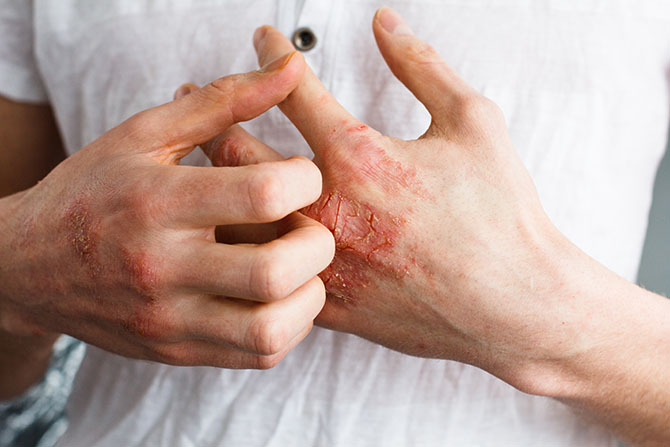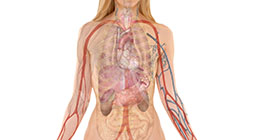
Overview
Symptoms
Causes
Prescription
Health Tips
Eczema is a group of skin conditions caused by inflammation in the skin, and due to abnormalities in the immune system, an overproduction of inflammatory and allergic reactions in the skin. This leads to poor resistance to bacteria and viruses on the skin. It is estimated that 10 percent of North Americans suffer from eczema. It is common in infants and toddlers and often appears when a child is teething, or after immunizations. There are many types of eczema: atopic (allergic), infantile seborrheic, adult seborrheic, occupational irritant contact, and allergic contact dermatitis.
Symptoms
Eczema skin inflammation commonly appears on the wrists, ankles, face, and in the creases of the knees, ears, between the fingers, and on the elbows. Possible characteristics of skin affected by eczema:
- Bacterial or viral infections are common
- Flaky, thick, or scaly
- Intense itching
- Skin thickening, often occurs after much scratching and rubbing
- Weeping, crusting, or changes in skin colour
Causes
Although not fully understood, it is believed that genetics and environmental triggers are at the root of eczema.
Children are more likely to develop eczema if there is a history of asthma, eczema or hay fever in the family. Triggers include stress, infections and climate changes. Stress is a major factor in adult eczema flareups. Those with eczema often have allergies, proven by allergy tests and elevated IgE levels, as well as a family history of the condition. Common allergens are food additives and preservatives, milk, eggs, wheat, soy, tomatoes, oranges and peanuts. Eczema may be the result of other conditions such as Candida albicans, leaky gut syndrome, or a lack of stomach acid. Those with eczema often have poor digestion which increases allergic reactions.
Severe essential fatty acid deficiency is also associated with the development of eczema, with the skin unable to hold moisture properly. In occupational irritant contact and allergic contact dermatitis, exposure to environmental allergens is often the source of the problem. Allergens, such as metal alloys in zippers and jewelry, dental braces, cosmetics, perfumes, rubber, latex and poison ivy are frequent contributors. Infantile seborrhea is more commonly known as cradle cap while in adults, seborrhea appears as red, dry, flaky skin, and when on the scalp, it may appear as mild dandruff.
Prescription for Health
Diet
Eczema is often linked to food allergies or intolerances. Keeping a food diary may help to root out any problematic foods. Record what is consumed at each meal and make note of any symptoms to observe correlations. To be certain seek referral to an allergy specialist and get tested for possible triggers. Once allergens are known they can be removed from the diet. Some foods that are often problematic for those with eczema are citrus fruits, dairy, wheat, soy and nut products.
- Avoid deep-fried foods, meat, food that is high in sugar and other refined carbohydrates (like white bread), caffeine, alcohol, and dairy products.
- Eat 7 to 10 half-cup servings of vegetables every day. If raw veggies are not eaten regularly, begin with steamed vegetables as this will be easier on the digestive system.
- Eat plenty of cold-water fishes (salmon, herring, halibut, mackerel) and fatty acid-rich seed and nut oils; these foods help heal eczema.
Supplementation
| Nutrient | Dosage | Action |
|---|---|---|
| Borage oil | Adults: 2000-3000 mg daily
Children: 500-1000 mg daily |
Reduces inflammation in the skin; improves moisture retention |
| Moducare sterols and sterolins | One capsule three times daily. Birth to five years of age should take one capsule daily; five to twelve years of age should take two capsules daily; twelve years and older should take the adult dose. | Normalizes IgE, controls histamine release, regulates immune function, enhances the immune system’s ability to fight bacteria and viruses, and regulates cortisol |
| Probiotic
Lactobacillus rhamnosus, Bifidobacterium, and Lactobacillus acidophilus |
3-50 billion CFUs daily | Probiotics strains researched for eczema |
| Quercetin | 1500 mg daily | Is anti-inflammatory, anti allergy, halts histamine release |
| Plant digestive enzyme | Two capsules with every meal | Aids digestion; those with eczema often have poor digestion, which increases allergic reactions |
Health Tips to Enhance Healing
- Do not take immune boosters because they enhance macrophage function and increase inflammation in the cells of the skin, thereby aggravating eczema.
- Drink plenty of pure, clean, filtered water every day.
- Get a thyroid test. Low thyroid function impairs the immune system causing increased inflammation.
- In addition to using borage oil orally (contains essential fatty acids), apply to the skin. Do a spot test before applying directly to eczema to prevent a reaction from first time use.
- Long term use of strong cortisone ointments can cause serious side effects and skin thinning. Do not use these continuously. Avoid using them on small children and determine underlying allergies quickly before chronic skin inflammation occurs.
- Oatmeal baths may be soothing, but hot water will dry out and aggravate irritated skin. Dry all areas after a bath or shower, especially behind the ears and in folds of arms and legs.
- Patients with eczema should always use moisturizers on their skin that are simple, non-irritating, and free of artificial fragrances, colorants, and preservatives, especially parabens.
- Use Celadrin cream topically to soothe and heal inflamed skin.
- Use hypoallergenic laundry detergents and rinse bedding, towels and clothing twice to eliminate detergent residue. Do not use fabric softeners or dryer sheets; these are often a source of skin irritation and allergy.










